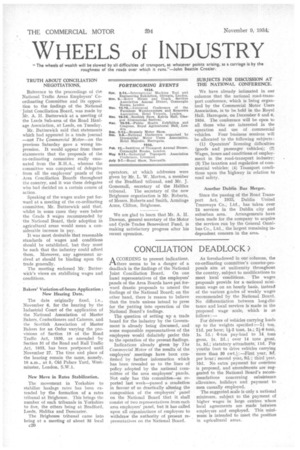WHEELS of INDUSTRY
Page 50

If you've noticed an error in this article please click here to report it so we can fix it.
"The wheels of wealth will be slowed by all difficulties of transport, at whatever points arising, as a carriage is by the TRUTH ABOUT CONCILIATION NEGOTIATIONS.
Reference to the proceedings of the National Traffic Areas Employers' Coordinating Committee and its opposition to the findings of the National Joint Conciliation Board, was made by Mr. A. H. Butterwick at a meeting of the Leeds Sub-area of the Road Haulage Association, at Leeds, on Tuesday.
Mr. Butterwick said that statements which had appeared in a trade journal —not The Commercial Motor—on the previous Saturday gave a wrong impression. It would appear from those statements that the proposals of the co-ordinating committee really emanated from the R.H.A., whereas the committee was composed of delegates from all the employers' panels of the Area Conciliation Boards throughout the country, and it was these delegates who had decided on a certain course of action.
Speaking of the wages scales put forward at a meeting of the co-ordinating committee, Mr. Butterwick said that, whilst in some cases they were below the Grade 3 wages recommended by the National Board, their adoption in agricultural areas would mean a considerable increase in pay.
It was most desirable that reasonable standards of wages and conditions should be established, but they must be such that the industry could afford them. Moreover, any agreement arrived at should be binding upon the trade generally.
The meeting endorsed Mr. Butterwick's views on stabilizing wages and conditions.
Bakers' Variation-of-hours Application : New Hearing Date.
The date originally fixed, i.e., November 6, for the hearing by the Industrial Court of the application of the National Association of Master Bakers, Confectioners and Caterers, and the Scottish Association of Master Bakers for an Order varying the provisions of Section 19 of the Road Traffic Act, 1930, as amended -by Section 31 of the Road and Rail Traffic Act, 1933, has been postponed until November 27. The time and place of the hearing remain the same, namely, 10 a.m., at 5, Old Palace Yard, Westminster, London, S.W.1.
New Move in Rates Stabilization.
The movement in Yorkshire to stabilize haulage rates has been extended by the formation of a rates tribunal at Brighouse. This brings the number of such tribunals in Yorkshire to five, the others being at Bradford, Leeds, Halifax and Doncaster,
The Brighouse tribunal came into being at a meeting of about 35 local c20
CONCILIATION
ACCORDING to present indications, there seems to be a danger of a deadlock in the findings of the National Joint Conciliation Board. On one hand representatives of the employers' panels of the Area Boards have put forward drastic proposals to amend the findings of the National Board; on the other hand, there is reason to believe that the trade unions intend to press for the putting into operation of the National Board's findings.
The question of setting up a trade board for the industry by the Government is already being discussed, and some responsible representatives of the employers would definitely prefer this to the operation of the present findings.
Indications already given by The Commercial Motor of the results of the employers' meetings have been confirmed by further information which has been revealed as to the lines of policy adopted by the national committee of the area employers panels. Not only has this committee—as reported last week—passed a resolution in favour of so drastically altering the composition of the employers' panel on the National Board that it shall consist of two representatives from each area employers' panel, but it has called upon all organizations of employers to withdraw the authority of present representatives on the National Board.
DEADLOCK?
As foreshadowed in our columns, the co-ordinating committee's counter-proposals aim at uniformity throughout the country, subject to modifications to meet local conditions. The wages proposals provide for a-national minimum wage on an hourly basis, instead of the various Fades of weekly wages recommended by the National Board. No differentiation between long-distance and local services is made in the proposed wage scale, which is as follows : For drivers of vehicles carrying loads up to the weights specified :-1-fr ton, lld, per hoar; 1/-2 tons, 1s.; 2/-6 tons, is. id.; 6-ton pay-load to 14 tons gross, is. 2d. ; over 14 tons gros4, Is. 3d.; statutory attendants, 11d. For youths (not to drive vehicles carrying more than 30 cwt.),:—First year, 8d. per hour; second year, 9d.; third year, 10d. No extra. payment for overtime is proposed, and amendments are suggested to the National Board's recommendations concerning subsistence allowance, holidays and payment to men casually employed.
The suggested scale is only a national minimum, subject to the payment of higher wages in large centres where local agreements are made between employers and employed. This minimum is intended to meet the position in agricultural areas.
























































































































